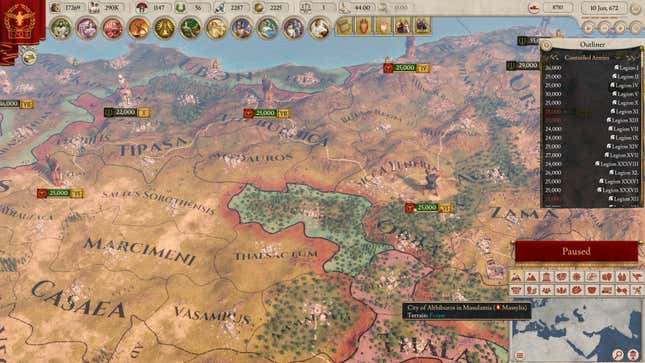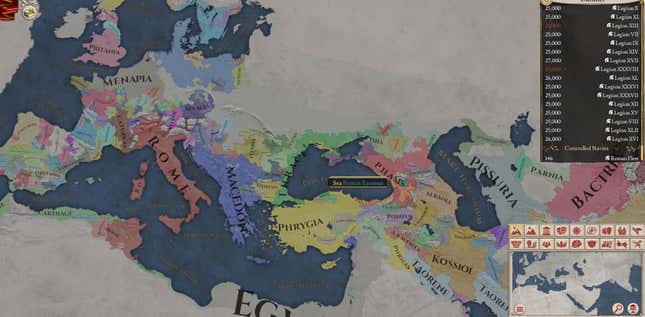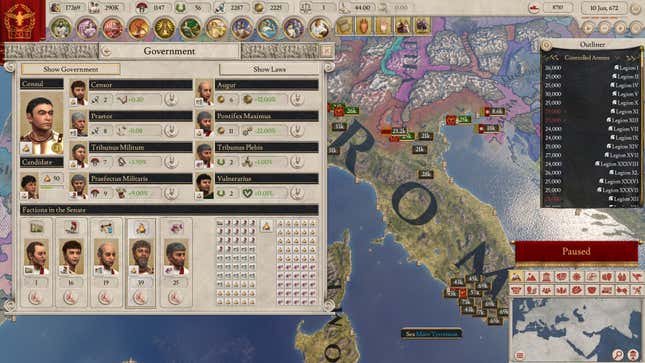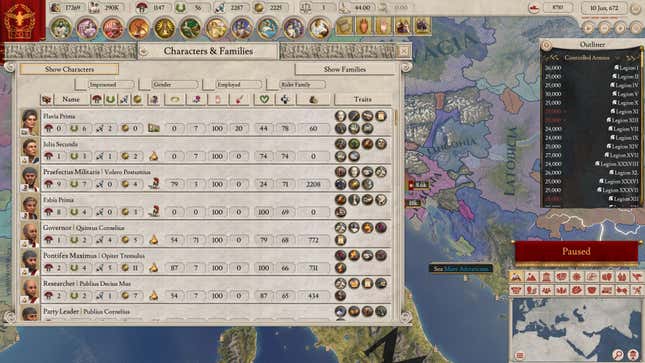I’ve been wondering for years what a Paradox grand strategy game would look like if it was designed for regular humans, and in Imperator: Rome I have my answer.
As long-time readers may know, I’m a big fan of Paradox’s grand strategy games, Crusader Kings II and Hearts of Iron IV especially. They’ve got a well-earned reputation for being games that are as complex as they are unwieldy, and while they can reward you with years of playtime, they can also take weeks (or even months) to learn how to play properly.
Understandably that’s an investment even fans of strategy games aren’t always willing to make, and the difficulty players have had grappling with Paradox’s interface has been a valid complaint for years. It’s not that the studio’s games are hard to play—in many ways the basic actions you perform are pretty simple—it’s that getting around their menus and learning how everything works in the first place has been a lot more difficult than it needed to be.
Imperator: Rome is not like this. It has many of the best parts of a big Paradox grand strategy (though not quite all of them, and I’ll get to that later), but can be (more) easily played by anyone who already knows their way around a Civ or Total War.

I know Stellaris made similar strides, but it was more of a traditional 4X game; Imperator is the full Paradox grand strategy experience, taking place on an enormous map, featuring a ton of factions, giving the player wide control over every aspect of the state and then populating that world with characters.
What sets it apart at first is the presentation. The game’s user interface is a far tamer beast than I’m used to, presented in a traditional fashion that relegates much of the game’s information to a large row of themed buttons at the top of the screen. It’s a trade-off—it can take some digging sometimes to find the information you need—but what’s crucial here is that it’s pretty obvious where you need to start digging in the first place, whereas in other Paradox games new players were often left with no clue.
Other little touches, like more helpful tips on mouse hovers, more useful notification flags, a wonderful macro builder, a short but sharp tutorial and the general organisation of data, just make everything feel faster, cleaner and more pleasant to be around. That might sound like the bare minimum for other genres and companies, but for Paradox it’s kind of a big deal.
Imperator is set in the early days of Rome’s expansion, and the tutorial (and name of the game, and interface design, and lure of the time period) is encouraging you to play as the titular faction, guiding it from a fledgling republic into the masters of the known world. But as with any other Paradox game you can play as any number of almost countless tribes and nations from the Iberian Peninsula to India, Carthage to Scotland.

Imperator may be the easiest Paradox game to come to grips with, but its also missing something at its heart. This isn’t the fault of the new UI, the subject matter or even the amount there is to do, it’s just down to the fact it’s not as laser-focused as some of the company’s other big games.
Europa Universalis fans will feel right at home here with the game’s general shape and economy, and Crusader Kings fans will immediately recognise the character and relationship system found here (more on that later), but where in those games they’re the bones of the whole experience, here they’re just side-dressing, nowhere near as deep or as interesting. They’re in the game, sure, but they’re not there for you to get lost in and make them your primary pursuit; they’re just here to prop up your armies.
Living up to its name, Imperator is simply about “painting the map”, the same kind of overall goal you’ll find in a game like Total War. You start the game, you grow powerful, then you grow...more powerful, enlarging your empire until you’ve had enough (or the game’s internal clock brings things to a close).
This isn’t a bad thing, it’s a very normal objective for military strategy games, and anyone whose primary association with Ancient Rome is of legions stomping their way through Gaul will be totally happy with this.
But endless expansion gets tiring after a while, and I found myself quitting and starting over a few times instead of seeing a single global conquest through to the end. Part of that might just be down to the conditions of reviewing a game like this, but I also think it’s because of a lack of context for your expansion: with no story or external pressures, there’s little reward or point to your expansion but the personal satisfaction of seeing the map changing colour, and that ran dry for me a few centuries in.
To Imperator’s credit starting over was at least fun, as the game’s replay value will surely come from trying out the immense number of factions available to the player, both large (Carthage, Egypt, Macedon) and small (well...everyone else). Taking part on such a massive map means that a game played in Britain or Persia is very different to Italy, in terms of terrain and resources, but also the very different government styles found between tribal societies and more organised states.
Despite the focus on military conquest, invasions and battles don’t actually take up too much of your time. Most of your brainpower and mouse clicks are spent confronting decisions the game gives you, where various characters or factions within your nation will create dilemmas that you as their disembodied supreme undying leader will need to settle. They’re usually tied nicely to the scandal and political intrigue of the time, as rival families bicker, religious leaders come to you with financial proposals, and senate factions offer support in return for favours.
Rarely is there a “correct” choice. Short-term fixes can have long-term consequences, and friends can later become enemies. Sometimes a matter can be settled immediately, sometimes you’ve unwittingly sown the seeds for a full-blown civil war.

I talked them down a bit above, but just because the game’s supporting systems aren’t as deep or important as other Paradox games doesn’t suddenly make them irrelevant or not enjoyable here. There’s of course an economy to manage, centred around building marketplaces and trading resources, which not only provides cash but also perks, with each resource assigned a relevant boost (grain will increase your population, hemp will strengthen your navy, etc).
You’re also given the power to manage your population. As your empire expands you’ll be taking over more and more people of different cultures and faiths, while also trying to keep a vast network of slaves both happy (relatively) and productive. The entire game’s population can be moved to different regions and/or forcibly converted to suit your needs, which...look it works, in a very blunt and ancient world kinda way, but it still feels awfully abstract doing it.
There’s also ancient religion to tinker with (mostly its a way to invest resources into giant boosts for your empire), and as I mentioned above, a character system similar to that which powered Crusader Kings. Whether you’re a tiny Scottish clan or Rome itself, Imperator is full of named characters populating its world, each of whom has a personality, a job and a family.

As I’ve said, it’s not the heart of the game like it was with Crusader Kings, so if the personal dramas there were the biggest thing you were looking forward to with Imperator, then you’re going to be disappointed. But as a way of simulating ancient intrigue and managing a primitive state, there’s still a lot of fun to be had messing around with the people in your empire.
You’re responsible for managing all their affairs, making sure everyone’s murderous ambitions are satiated, backs are scratched and traitorous generals are kept in line. You’ll find you can skim through a lot of it if you like (since relationship slates are often wiped clean as leaders emerge and people die), but it’s still a fun addition to a game about Ancient Rome since it really adds a great dramatic touch. Caesar may have spent a lot of time marching through forests at the head of legions, but he was undone by a bunch of angry dudes in togas.
A nice final surprise was Imperator’s presentation. Its loading screens and pop-up art is of a higher standard than that normally seen in Paradox games, and the overall aesthetic is about as Roman (and yet appropriately tasteful) as you could ask for. Combined with the UI changes it really does contribute to the feeling that this is a more concerted effort from the company to makes its games look at least a little more presentable.
Imperator: Rome isn’t my favourite Paradox game, but it may well be one of the company’s most important, because it finally gives me something I can point to and say, here, if you’re tired of me talking about these games but don’t think you can play them yourself, try this one.
It strikes a great balance between retaining much of what makes a Paradox grand strategy game so time-consuming while streamlining its approach and interface. If you’ve always been curious about Paradox games but too scared to try one, Imperator—with its sample platter of systems drawn from many of its other big series—is a good place to start.
